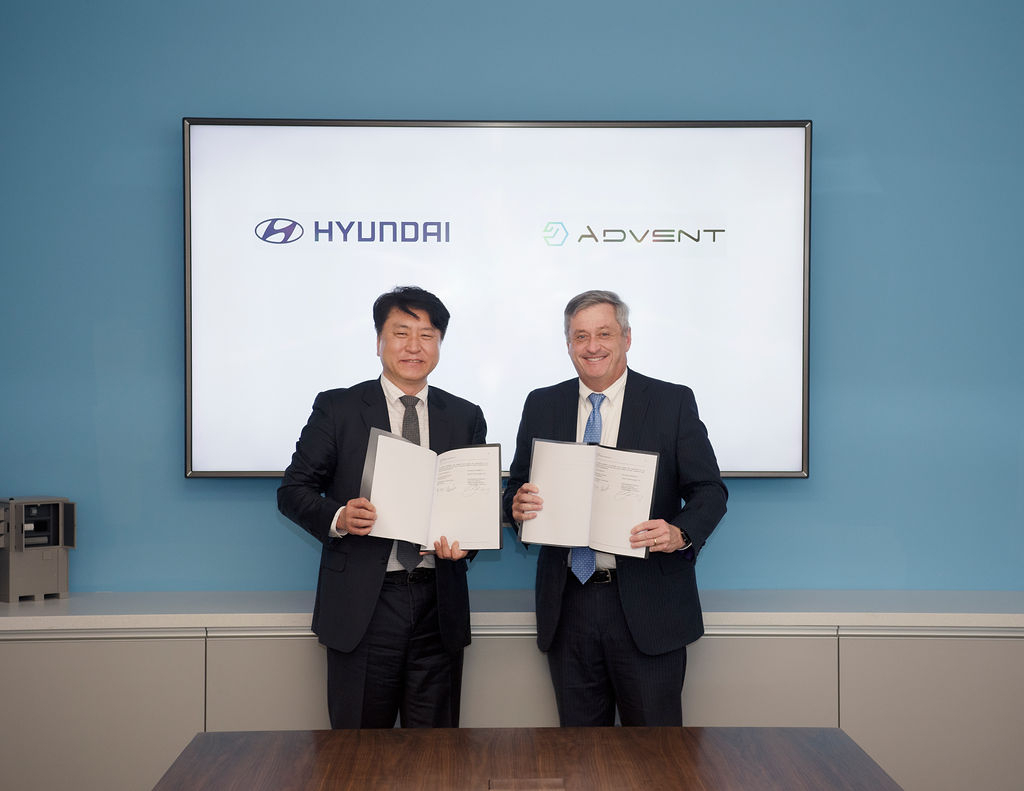 |
Hong Seung-hyun, head of the materials division at Hyundai Motor Group (left), and Jim Coffey, chief operating officer at Advent Technologies, pose after signing a memorandum of understanding at Advent Technologies headquarters in Boston on Tuesday. (Hyundai Motor Group) |
Hyundai Motor Group said Thursday it has signed a memorandum of understanding with the US-based Advent Technologies to develop hydrogen fuel cells, with the goal of ramping up its hydrogen car business.
Under the partnership, the carmaker plans to acquire key technologies for hydrogen fuel cells that can operate at 200 degrees Celsius from Advent Technologies by 2024. It will provide ion transfer materials and catalysts to the Boston company, who will use them and support the technology required to develop the fuel cells, as well as membrane electrode assembly, a key component of the batteries.
The two companies have carried out joint research for a year, starting in 2022, to enhance the productivity of membrane electrode assembly by increasing the energy density of fuel cells.
The high-temperature batteries are more cost-effective and stable than those working under 100 degrees Celsius, according to the company.
“Fuel cells are highly likely to become the next generation of green energy for large transportation such as air carrier and vessels. Hydrogen-powered batteries that can endure high temperatures will expand the eco-friendly mobility business,” it said.
The existing low-temperature hydrogen fuel cells require a lot of costly white gold as a catalyst and humidifier in the production process. On the other hand, high-temperature batteries can be made with small amounts of white gold and do not require moisture.
“With the net zero initiative, we will make efforts to develop key materials for high-temperature fuel cells,” said Hong Seung-hyun, head of the materials division at Hyundai Motor Group. “It will be an opportunity to use the battery technology in a diverse (transportation) business.”
Hyundai has maintained its leadership position in the global hydrogen-powered car market for four consecutive years.
According to data from market tracker SNE Research, the carmaker sold 332 units of its flagship hydrogen car Nexo in January alone, outpacing its rivals Toyota, Wanxiang and Youtong. Last year, it recorded a 54 percent market share after selling 11,179 units, a 21.2 percent jump from a year before.
Industry insiders say Hyundai is expected to see a huge spike in hydrogen car sales in both domestic and global markets.
The South Korean government announced last month it will push the sales of hydrogen-powered vehicles to reach 47,000 units including 16,000 of Hyundai’s Nexo cars this year. It will provide approximately 35 million won ($27,300) in subsidies to those who purchase Nexo, which is priced at around 60 million won.
As for overseas sales, the carmaker is likely to benefit from the renewed bilateral ties between Korea and Japan, sources said.
The Japanese government vowed to expand sales of clean cars, reducing the sales of internal combustion engine vehicles to take up a 30-50 percent market share. In particular, it plans to supply 200,000 units of hydrogen cars by 2025.







![[Today’s K-pop] Blackpink’s Jennie, Lisa invited to Coachella as solo acts](http://res.heraldm.com/phpwas/restmb_idxmake.php?idx=644&simg=/content/image/2024/11/21/20241121050099_0.jpg)